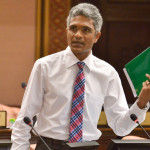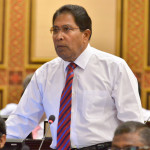A group of concerned citizens protesting a controversial Rf20,000-a-month (US$1,290) committee allowance, approved by MPs for themselves in December 2010, have filed a case at Civil Court seeking a court order to stop the Finance Ministry from releasing the funds to parliament.
A loose association of concerned citizens and members of civil society organisations launched a campaign last month after parliament’s Public Accounts Committee (PAC) decided to issue a lump sum of Rf140,000 (US$9,000) as committee allowance back pay for January through July this year.
Speaking to press outside the court building, lawyer Mohamed Shafaz explained that the grounds for the claim were constitutional provisions on non-discrimination (article 17) and equal protection and benefit of the law (article 20).
“For example, the reduced amount from civil servant’s salaries was in the 2010 budget [to be paid back] and in the 2011 budget as well if you look at it properly,” he said, arguing that Finance Ministry could not release funds for MPs’ committee allowance, which was approved in December 2010, without paying back civil servants.
“The money is coming from the same place,” Shafaz continued. “If something the civil servants have not received is going to be given to others, which was approved much later, the chance of civil servants receiving the reduced amount will be very slim.”
A court order was sought to halt the release of the funds until a court of law delivers a ruling on the issue, Shafaz said.
Shafaz also referred to article 43 of the constitution, which states that “Everyone has the right to administrative action that is lawful, procedurally fair, and expeditious.”
Austerity or bust
In October 2009 – almost a year into the new administration – unpopular pay cuts of up to 15 percent for civil servants were enforced as part of austerity measures to alleviate the country’s ballooning budget deficit – among the highest in the world at 26 percent of GDP in 2009 (the International Monetary Fund had refused financing to Sri Lanka because the country’s fiscal deficit reached 10.5 percent).
However the austerity measures were met with a severe political backlash. In December 2009, the opposition-controlled parliament added Rf800 million (US$62 million) to the 2010 state budget, including the restoration of civil servant salaries to previous levels and subsidies for sectors ranging from fishing and agriculture to private media.
“One of the primary drivers of the large fiscal deficit has been government spending on public wages, which has more than doubled between 2007 and 2009, and is now one of the highest in the world relative to the size of the economy,” Rodrigo Cubero, IMF mission chief for the Maldives, said in January 2010.
“Measures that would substantially raise the budget deficit, such as a reversal of previously announced wage adjustments, would also put the [IMF-backed structural adjustment] programme off track, jeopardising prospects for multilateral and bilateral international financing,” Cubero warned at the time.
After weeks of legal wrangling over restoring civil servants salaries, the Ministry of Finance accused the Civil Service Commission (CSC) of hiding “a political agenda”, and in February 2010 filed a case with the police asking them to investigate it on suspicion of trying to topple the government “and plunge the Maldives into chaos.”
At the height of the dispute in early 2010, permanent secretaries were ordered to submit different wage sheets by both the Finance Ministry and the CSC.
In April 2010, the Civil Court ruled that Finance Ministry did not have the legal authority to overrule the CSC. Although the government contested the ruling and refused to restore salaries to previous levels, the High Court upheld the lower court ruling in May this year.
Consequently in November 2010, the IMF delayed its third disbursement under the US$92.5 million programme, citing “fiscal slippages” caused by insufficient progress towards reducing the wage bill and passing tax legislation.
In March this year, Cubero told Minivan News that the IMF saw “bringing the fiscal deficit down as the key macroeconomic priority for the Maldives.”
“A large fiscal deficit pushes up interest rates, thereby undermining private investment and growth, and also drives up imports, putting pressure on the exchange rate and inflation, all of which hurts the Maldivian people, particularly the poor,” he said.
“With the government borrowing at the rate it has [to plug the deficit], it reduces the amount of credit available to the private sector, and that constrains the ability of the private sector to provide jobs and employment,” Cubero explained. “That then constrains economic growth. Furthermore, by spending more than it earns, the government is putting pressure on imports and the exchange rate.”
An internal report by the World Bank obtained by Minivan News observed that the Maldives was “facing the most challenging macroeconomic situation of any democratic transitions that has occurred since 1956.”
Civic action
Volunteers for the civic campaign meanwhile distributed information leaflets at bus stops in Male’ yesterday.
“Two of our group went on the bus and talked to passengers,” said Badr Naseer, a senior activist in the effort. “Ninety-nine percent of people support [the cause].”
Badr said he had personally filed a complaint at the Anti-Corruption Commission (ACC) requesting an inquiry into claims by some MPs that they functioned as “welfare officers” for their constituents.
Earlier this month, Transparency Maldives (TM) condemned remarks by MPs justifying the inflated allowance, noting that “such actions fall under article 3 of of the anti-corruption law and article 13 of the Anti-Corruption Commission Act regarding bribery.”
Badr revealed that the group had met MP Ibrahim Mohamed Solih, parliamentary group leader of the ruling Maldivian Democratic Party (MDP) and MP Ahmed Thasmeen Ali, leader of the opposition Dhivehi Rayyithunge Party (DRP) as part of diplomatic efforts alongside the street activism.
He added that the citizens group also hoped to meet former President Maumoon Abdul Gayoom – who is in the process of forming a new party with a number of MPs previously in the DRP – to discuss the committee allowance issue.
The awareness raising campaign is set to continue from 4:30pm to 6:00pm today at bus stops and ferry terminals in Male’.






i salute to these guys! political parties pretend they care about maldivian citizens but this case itself proves that they dont give a damn about us.
Have you ever heard an Indian proverb; “The final stage of a crook is politics”; this proverb apply to majority of distinguish crooks in the parliament.
Is this civil society or Team Bouganvilla?
Correction: We are planning to meet DRP leader Thasmeen Ali as well. We have not met him yet.
B@@@@@s MPs!! GREEDY MP's!! Blood sucking MP's!!
good for them - the MP's should set an example not exploit the general public. their greed is disgraceful and totally unjustified. The MDP lot are mostly against this pay allowance. Same old greedy short sighted DRP displaying the same behaviour that got them booted out of office in the first place!!
Team Bouganvilla...hahaha nice one!
This is so obvious.. a team of 12 people who are working right beside the government... doing the dirty/"pious" work in the name of mass civilians.
We voted these people into office.
We granted them the power to fix their own salaries.
If you feel they have abused their powers, then do not vote for them come next round.
I feel that President Nasheed has abused just about every power and shirked almost all duties handed to him by the Maldivian people. But I support the voices who call to wait for an election in order to unseat him.
We work eight hours a day ,six days a week..not sitting at a desk,but back breaking work,public service at the risk of our lives and health and we don't get paid 8,000 rufiyaa ..Then how do you already privileged members deserve a penny more...that much paid just to sit luxuriously&attending the majlis few days a week or remain absent as you please ,not doing any of the work that you promised at the time of election,when begging for votes?
Oh pls dont give all the credit to Bougan Villa. Why, because Ibra used to be an open critic of parliament and government? Yes most MDP activists dont like this and call this group "Haekka Kenain". I say Haekka Kennain is better any day when compared to 1000s of Robotic activists who will only do as their MPs and Party bosses say. View video 1 to see the smirking MP of Baarashu dhaaira who is being defended by his Loyalist activist who probably gets paid every month (in coffee and cash) by this MP.